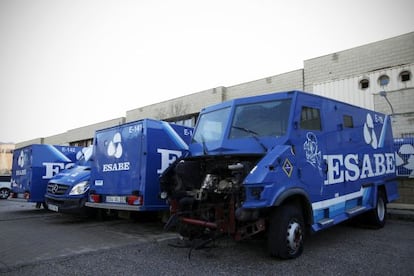The downfall of the great procurer
Businessman Juan José Prados had a gift for buying off officials But he has disappeared, leaving millions of euros of debts behind him


At number 15 Belfast street, inside an industrial park outside Madrid, an enormous construction houses the remains of what, until just a few months ago, used to be one of Spain's largest security companies: Esabe. Inside the warehouse there are 30 armored vehicles, cleaning machinery and alarm systems worth two million euros. All of it will be declared abandoned on February 24 if the owners fail to show up and claim the equipment.
But that is not likely to happen. The owner, Juan José Prados del Pino, 65, has been a fugitive from justice since October 2012, when he skipped the country with his wife, María Pilar García de la Torre, 58, and one of their three adult children, who has a disability.
So far, Prados has managed to avoid being caught by the law. A Madrid judge is accusing him of crimes against Social Security and workers' rights - he owes over 30 million euros - and an international arrest warrant has been issued against him. The first clues point to Argentina and Portugal.
But the fact is, neither the police who are working on the case, nor the judge, nor the 2,000 employees who have reported him for defaulting on their wages, truly know the exact size of the hole their boss left behind.
Prados often reminded his executives that he was "God"
A heavy-set, paternalistic entrepreneur who excelled at buying off government workers to secure multimillion contracts for his companies, Prados even won the bid to provide security for the Labor and Social Security Ministry, which paid more than six million euros to have his men watch over the premises. A long list of public servants and more than one union leader were seen inside his private, 20-seat Real Madrid box, and on his 31-meter yacht Sweet Dreams 2. "He was a great procurer," confesses a former employee and friend of the fugitive.
The case recently took an unexpected turn when Antonio Silva, an Esabe executive who was arrested along with 10 other people during a raid in December 2012, handed over 200 rubber seals, templates and stickers from dozens of official agencies in Valencia, Madrid, Badalona, Cáceres and Seville to the investigating judge, Purificación Romero. These items were allegedly used to forge public documents, sources familiar with the investigation told EL PAÍS.
What were the stamps from the Public Works and Justice ministries used for? And what about those representing the Valencian Health Agency, the Municipal Water Corporation of Seville or the Madrid region's Department of Justice and Internal Affairs, where Esabe landed contracts worth eight million euros? Not to mention the templates for official documents from the Territorial Management Office of Extremadura, the Leganés Comptroller's Office, the Alicante University General Hospital and the La Latina Municipal District Council in Madrid.
Police inspectors believe that Esabe forged documents from the agencies where it was bidding for contracts to make it look as if it was up to date with its social security payments, which is a requirement for any bidder. One of the targets of the investigation confessed that a certain individual named Eloy, based in Valencia, helped Esabe win the contract for La Fe Hospital.
"There must have been connivance between politicians and the company," says Antonio Duarte, secretary of the union FTSP-USO, which has filed a complaint against Esabe.
In the late 1980s, Juan José Prados was the CFO of Esabe Ingeniería, one of the country's largest security companies. But the firm went bankrupt soon after, and Prados set up ESB (later renamed Esave and Esabe) with five other people. The original headquarters was a modest apartment in the Madrid neighborhood of Ciudad Lineal. The security guard Manuel Jurado was one of the first 25 people to work for him.

"He obtained the security contract for Nuevos Ministerios and opened branches across Spain. He came to the bids with very aggressive offers. If a service required 100 security men, he did the job with 80 and covered the rest with extra hours. He was a machine when it came to financial issues - he'd pull out a calculator and start doing the math straight away."
Prados' dream was to emulate the old Esabe, and he managed it. He expanded the firm's activities to armored transportation, alarm systems, cleaning and ancillary services. The staff grew to 6,000 people. In just a few years, the little apartment in Ciudad Lineal was dropped and an entire building rented on Madrid's Cronos street, complete with a gym, training school and a giant basement that housed the armored safeboxes and security vehicles. His red Ferrari sat in the parking lot, next to his chauffeur's Audi 8. Prados' office was on the fourth floor, and contained a white marble table where he sat with his executives, to whom he paid bonuses to get them to front as managers of his other companies, and whom he often reminded that he, Prados, was "God." It is interesting to note that Prados' name does not appear on any of the group's 23 firms. "He was severing the ties because of his age," alleges his lawyer, Alberto Salido.
The first complaints came in 2009. Workers were being paid late and getting their overtime on the side, rather than as part of their regular paycheck. A work inspector named José María Ramos began showing up at Esabe, and María G., who was head of human resources, started going to the Work Inspection Office every Tuesday to deflect the blows. "There were many sanctions planned against us, but we filed appeals to delay them for a year," explains this now former worker. When the hefty fines did begin to arrive, they were not paid, and the company accounts were seized accordingly.
In 2011, Prados stopped paying his workers for their overtime, and a flood of complaints reached the courts. The next step was not paying the regular wages. A security man who was owed several months' pay ended up hanging himself in Seville.
“Do you know who God is?”
“No.”
A security guard who was owed several months' pay hanged himself
“You know him well. You’re standing in front of him.”
Security guard Francisco Quintero, 46, recalls this conversation, which he had with Prados when he walked in to inform his boss that his 50 square-meter apartment in Carabanchel (Madrid) was going to be seized by the bank because he was not meeting his mortgage payments. “He gave me a lot of good words, but I didn’t get my money and ended up losing the house. He always used to say that he took good care of his men and women.”
On the weekend of October 12, 2012 Prados and his wife said goodbye to their most loyal employees: "See you on Monday." That was the last time he was seen at Esabe headquarters. Two months later came the police raid. "We looked for him, but could not find him," says a police official.
Salido, Prados' lawyer, says that his client left because "he feared a lynch mob. The administration owes him nearly 20 million euros. He didn't pay because he wasn't getting paid himself. That's the cause of everything."
Prados' lavishness with gifts earned him many favors, information about bids and fast-track payment in Madrid and Valencia. "There were parties, watches and even a BMW 320. He was quite splendid with the government workers who dealt with the contracts," confesses a former colleague and friend.
The yacht disappeared after the judge turned down the police's request to have that seized as well. The last time anyone saw it, it was sailing towards Gibraltar. "He had something going on there," says a former Esabe executive.
Tu suscripción se está usando en otro dispositivo
¿Quieres añadir otro usuario a tu suscripción?
Si continúas leyendo en este dispositivo, no se podrá leer en el otro.
FlechaTu suscripción se está usando en otro dispositivo y solo puedes acceder a EL PAÍS desde un dispositivo a la vez.
Si quieres compartir tu cuenta, cambia tu suscripción a la modalidad Premium, así podrás añadir otro usuario. Cada uno accederá con su propia cuenta de email, lo que os permitirá personalizar vuestra experiencia en EL PAÍS.
¿Tienes una suscripción de empresa? Accede aquí para contratar más cuentas.
En el caso de no saber quién está usando tu cuenta, te recomendamos cambiar tu contraseña aquí.
Si decides continuar compartiendo tu cuenta, este mensaje se mostrará en tu dispositivo y en el de la otra persona que está usando tu cuenta de forma indefinida, afectando a tu experiencia de lectura. Puedes consultar aquí los términos y condiciones de la suscripción digital.








































